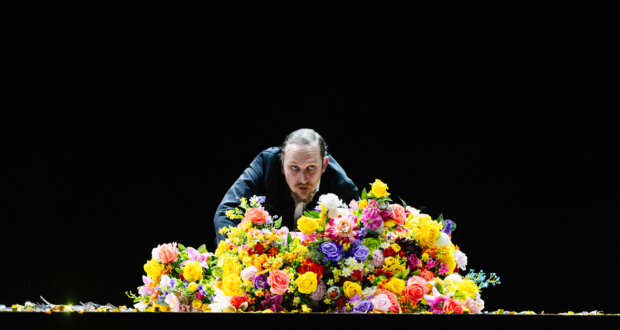Incredible singing shines out of an adapted performance.Summary
Rating
Unmissable!
Based on the French fairytale, Bartok’s 1918 Bluebeard’s Castle is an intense hour of music for only two singers, playing Duke Bluebeard and his new wife, Judith. In this stunning concert, semi-staged by director Joe Hill-Gibbins, designer Rosanna Vize and lighting designer Ian Jackson-French, Bluebeard’s Castle is a long, sparse wedding table lit from above in a harsh, white light. Arriving at his castle, Judith asks Bluebeard to open his forbidden seven doors. The contents of his doors are represented in stylish symbols – the blood stained armoury is a heavy set of fine silverware, the blood of his torture chamber is a dozen or so bottles of Bordeaux.
The worst sin in opera is to go on stage in bad voice. It’s not uncommon to have last minute cast changes, and singers are used to being flown in (often literally) at the last minute so that the show can go on. The music comes first, of course, so a conductor will spend all of the time they can on getting the singer up to speed – in only a few hours or so a singer has to familiarise themself with the music and the conductor’s vision for the piece. Saving the day is no easy task. Unfortunately, Allison Cook was ill for the first performance, but luckily, the wonderful Jennifer Johnson (who sang the role in Oslo earlier this year) was rushed in to cover in time. Her voice is tremendous, with incredible precision and striking excitable character.
The last minute soprano swap leaves no time for stage rehearsal. In this instance, ENO staff director Crispin Lord walks the role with full commitment, including the dress, whilst Johnston sings from a side. Lord’s muteness casts an eerie shadow on the story and an unexpected queer tone. The whole staging is rather sexy and there’s a real feeling from Judith that she wants what’s coming. By the time Bluebeard unlocks his seventh and final door, we get the sense there is no fear of it, just lust after it.
John Relyea, fresh from playing a booming, sincere Sorastro in The Magic Flute, is the finest bass singing anywhere today and he truly comes into his own as a Bluebeard with an amazing depth of character. At times smooth, and at others blunt he sings this role filled with anguish but also a carnal thirst.
Congratulations must go to conductor Lidiya Yankovskaya for bringing such a wonderful show together. Not a moment is wasted. Her encouragement of the brass section often makes Bartok sound like Wagner, and the ENO orchestra sound twice its size. From a soft and muted beginning to the triumphant opening of the door to Bluebeard’s kingdom, every moment has tension, torture or release. Everything comes together so well to create an expertly sleek and sexy performance.
Composed by: Béla Bartók
Conducted by: Lidiya Yankovskaya
Directed by: Joe Hill-Gibbins
Design by: Rosanna Vise
Lighting by: Ian Jackson-French
Produced by: English National Opera
Duke Bluebeard’s Castle has completed its current run.
 Everything Theatre Reviews, interviews and news for theatre lovers, London and beyond
Everything Theatre Reviews, interviews and news for theatre lovers, London and beyond




One comment
Pingback: DIE MONTAG-PRESSE 25. MÄRZ 2024 - Klassik begeistert